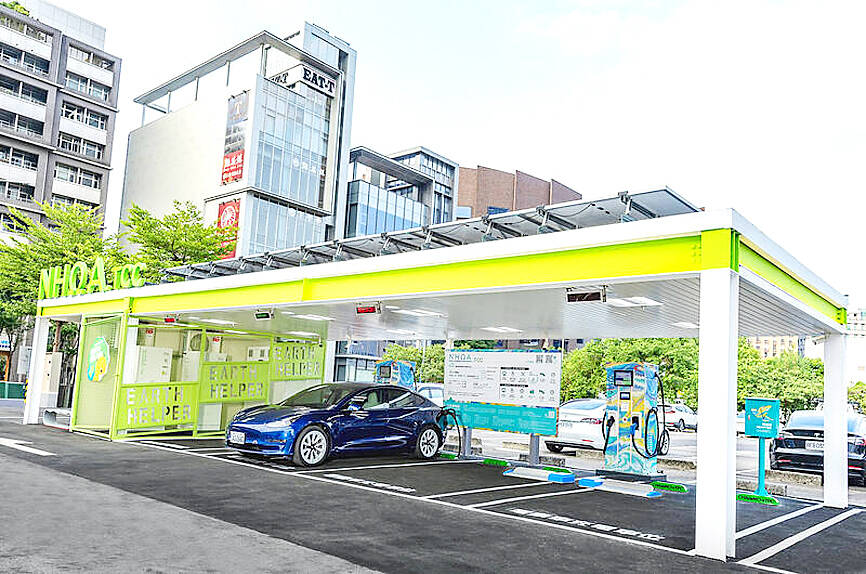Fines are to be imposed from next month on gasoline and diesel cars parked in spaces designated for electric vehicles, the Taipei Parking Management and Development Office said.
The office said the new rule is to be imposed from Friday and that, as per the Parking Facility Act (停車場法), owners of vehicles with traditional internal combustion engines are to be fined NT$600 to NT$1,200 if they park illegally.
Parking spots designated for electric cars in Taipei function as charging stations and are marked by green lines.

Photo courtesy of Taiwan Cement Corp
The office said the new measure is in line with a Ministry of Transportation and Communications regulation that forbids non-electric cars occupying parking spaces designated for electric vehicles.
Parking fees for electric cars are to be altered, with the amount payable set to be calculated by electricity consumed per kilowatt-hour, it added.
Electric car owners pay NT$10 per hour more than drivers of fuel-powered vehicles, with another NT$10 per hour levied on electric car owners who do not charge their vehicles while parked.
Meanwhile, Democratic Progressive Party Taipei City Councilor Ho Meng-hua (何孟樺) on Friday said that the Taipei City Government needs to improve its policies regarding electric cars.
Ho said that the city had only installed about 600 parking spots for electric cars, despite aiming to have 1,200 by next year.
Ho added that 150 of the installed spots were inside parking lots, with some reporting that their charging equipment was being used less than 20 times a month.
Ho said city data showed that Taipei’s Zhongzheng (中正), Nangang (南港) and Daan (大安) districts each had fewer than 30 electric car parking spaces as of the end of last year.
Taipei needs to conduct thorough research before building new parking spaces to maximize efficiency, she added.

Taiwan is stepping up plans to create self-sufficient supply chains for combat drones and increase foreign orders from the US to counter China’s numerical superiority, a defense official said on Saturday. Commenting on condition of anonymity, the official said the nation’s armed forces are in agreement with US Admiral Samuel Paparo’s assessment that Taiwan’s military must be prepared to turn the nation’s waters into a “hellscape” for the Chinese People’s Liberation Army (PLA). Paparo, the commander of the US Indo-Pacific Command, reiterated the concept during a Congressional hearing in Washington on Wednesday. He first coined the term in a security conference last

Prosecutors today declined to say who was questioned regarding alleged forgery on petitions to recall Democratic Progressive Party (DPP) legislators, after Chinese-language media earlier reported that members of the Chinese Nationalist Party (KMT) Youth League were brought in for questioning. The Ministry of Justice Investigation Bureau confirmed that two people had been questioned, but did not disclose any further information about the ongoing investigation. KMT Youth League members Lee Hsiao-liang (李孝亮) and Liu Szu-yin (劉思吟) — who are leading the effort to recall DPP caucus chief executive Rosalia Wu (吳思瑤) and Legislator Wu Pei-yi (吳沛憶) — both posted on Facebook saying: “I

Sung Chien-liang (宋建樑), who led efforts to recall Democratic Progressive Party (DPP) Legislator Lee Kun-cheng (李坤城), was released on bail of NT$80,000 today amid outcry over his decision to wear a Nazi armband to questioning the night before. Sung arrived at the New Taipei District Prosecutors’ Office for questioning in a recall petition forgery case last night wearing a red armband bearing a swastika, carrying a copy of Adolf Hitler’s Mein Kampf and giving a Nazi salute. Sung left the building at 1:15am without the armband and covering the book with his coat. Lee said today that this is a serious

The Ministry of Economic Affairs has fined Taobao NT$1.2 million (US$36,912) for advertisements that exceed its approved business scope, requiring the Chinese e-commerce platform to make corrections in the first half of this year or its license may be revoked. Lawmakers have called for stricter enforcement of Chinese e-commerce platforms and measures to prevent China from laundering its goods through Taiwan in response to US President Donald Trump’s heavy tariffs on China. The Legislative Yuan’s Finance Committee met today to discuss policies to prevent China from dumping goods in Taiwan, inviting government agencies to report. Democratic Progressive Party Legislator Kuo Kuo-wen (郭國文) said